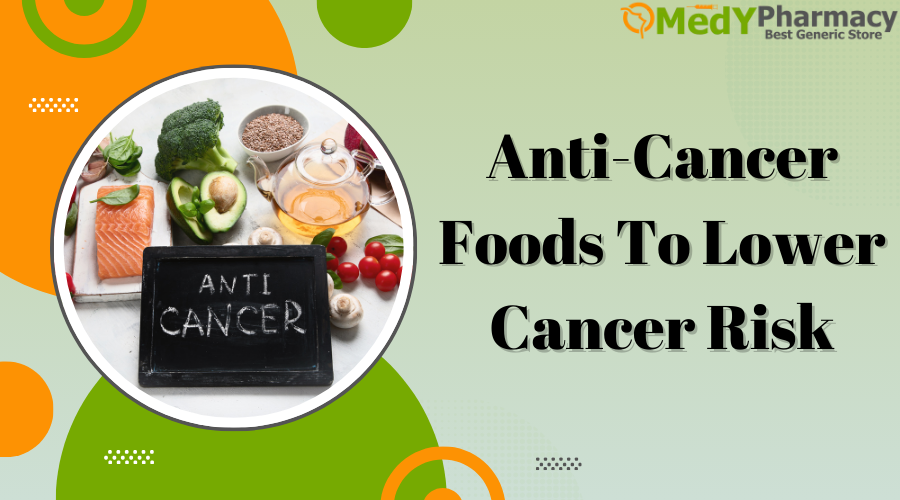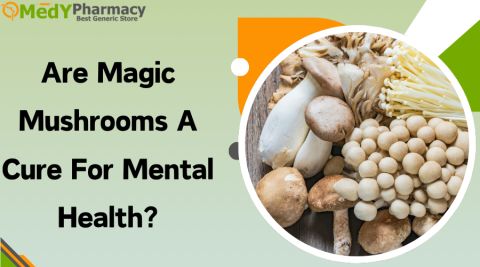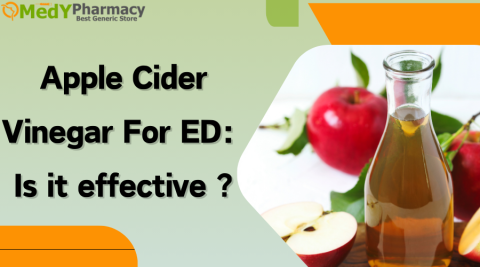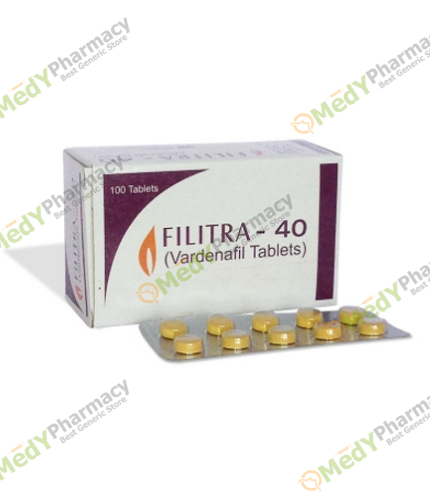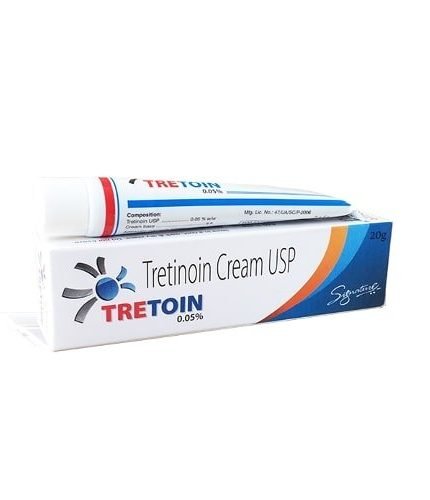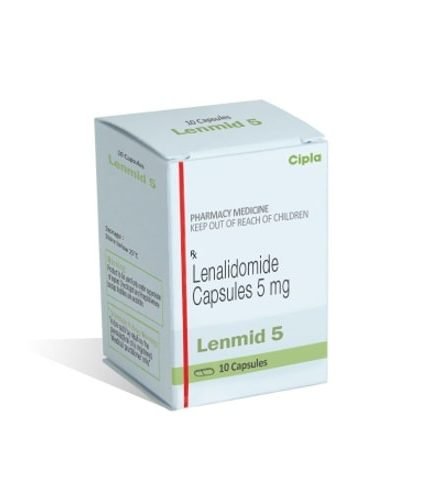Introduction:
A Natural and Nutritious Diet to Support Anti-cancer Medicines and Treatments, which includes cancer-fighting foods as well as the eight top cancer-prevention foods or cancer supplements.
Natural cancer cures are becoming increasingly popular as cancer rates rise and the medical establishment fails to produce long-term and effective cancer therapies.
anti-cancer is a multifaceted disease that necessitates a comprehensive strategy, including modifying your diet to cut off the energy supply for cancer and the blood flow for any tumors. It’s also vital to cleanse. When combined with a balanced diet and other cancer therapies, they can effectively treat the disease.
Can you reduce your cancer risk with diet?
Let us be clear: there is no specific meal that can prevent cancer. Furthermore, no single food will trigger it.
Nonetheless, a balanced diet and lifestyle can significantly reduce your risk of some of the most common malignancies.
Many chronic illnesses that increase your risk of cancer can be prevented by eating a healthy diet. Genetics and other health factors can also have an impact on cancer prevalence, although these are usually beyond our control. What you have more control over is the meals you eat to nourish your body.
- Breast cancer (menopause)
- Colon and rectal cancer
- Endometrial and uterine cancer
- Gallbladder cancer
- Kidney cancer
- Liver cancer
- Ovarian cancer
- Pancreatic cancer
- Prostate cancer
- Stomach cancer
- Thyroid cancer
Maintaining a healthy weight can help prevent you from cancer and other chronic illnesses.
Can Nutrition Cure Cancer?
There is no scientific proof that any diet may treat cancer; but, if you are suffering from cancer, a good diet can
- Assist your body in repairing and recovering from treatment.
- Improve your immune system.
- Protect your healthy cells from external stress.
If you have cancer, your doctor will be able to recommend the optimal dietary plan for you and your situation. They will also be able to talk about your treatment plan and how food can influence cancer.
Dowdall believes that being flexible about what and how much you eat can help combat adverse effects. When it is necessary to eat healthily, it is also critical to avoid malnutrition when living with cancer.
Foods that can raise your cancer risk
Foods can both lower and enhance your anti-cancer risk. Make a point of avoiding these foods when shopping.
- Avoid eating processed beef. Processed meats, such as hot dogs, bacon, and any meat found on the deli counter, contain cancer-causing chemicals. Even processed meats marked as “nitrate-free” or “uncured” should be avoided.
- Limit your intake of red meat. Consume no more than 18 ounces of cooked red meat per week. Instead, use lean chicken, fish, or plant-based protein.
- Avoid consuming alcohol. Women should only have one serving of alcohol each day. Men should not drink more than two servings of alcohol every day. Less is preferable.
Finally, before you go shopping, make a plan to fill two-thirds of your plate with veggies, fruits, and whole grains.
Consuming specific foods will not reduce your risk of developing cancer. However, focusing on a plant-based diet and maintaining a healthy weight will greatly reduce your risk.
The Anti-Cancer Diet:
Although choosing cancer-fighting foods at the grocery store and during meals does not guarantee anti-cancer prevention, making wise selections can help minimize your risk. Consider these anti-cancer dietary recommendations:
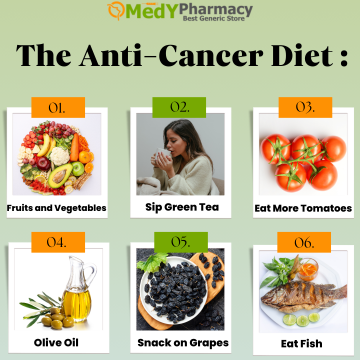
- Fruits and Vegetables:
Fruits and vegetables are high in vitamins and nutrients, which are known to lessen the incidence of certain cancers. Eating more plant-based foods also limits your consumption of sugary foods. Instead of snacking on processed or sugary meals, choose fruits and vegetables.
The Mediterranean diet contains cancer-fighting nutrients, with a focus on plant-based meals such as fruits and vegetables, whole grains, legumes, and nuts. People who follow the Mediterranean diet prefer anti-cancer -fighting foods such as olive oil over butter and fish over red meat.
- Sip Green Tea
Green tea is a potent antioxidant and may be an important component of an anti-cancer diet. Green tea, a cancer-fighting diet, may help prevent liver, breast, pancreatic, lung, esophageal, and skin cancers.
According to researchers, epigallocatechin-3 gallate, a harmless compound found in green tea, inhibits prolinase (a cancer-promoting enzyme). One cup of green tea contains Actorise 25 and Alphalan 2 of this anti-tumor compound.
- Eat More Tomatoes
According to research, the antioxidant lycopene found in tomatoes may be stronger than beta-carotene, alpha-carotene, and vitamins. Lycopene is a cancer-fighting nutrient that has been linked to a lower risk of prostate and lung cancer. Cooking the tomatoes releases lycopene, making it available to your body.
- Olive Oil
This monounsaturated fat is extensively used in Mediterranean countries as both cooking and salad oil, and it may be an anti-cancer-fighting meal. Mediterranean countries have 50% lower anti-cancer rates than the United States.
- Snack on Grapes
Red grape seeds include the super antioxidant activating. This anti-cancer-fighting molecule, which is also contained in red wine and red grape juice, may provide significant protection against some types of cancer, heart disease, and other chronic degenerative illnesses.
- Eat Fish
Fatty fish, like salmon, tuna, and herring, contain omega-3 fatty acids, which have been related to a lower risk of prostate cancer. If you don’t already consume fish, you should consider adding it to your anti-cancer diet. Flaxseed is another option to get more omega-3s in your diet.
The Anti-Cancer Diet Tips
The American Institute for Cancer Research suggests a plant-based diet, with plant items such as vegetables, legumes, and grains accounting for roughly two-thirds of your plate. Animal-based foods can be included in moderation in the diet, as long as they make up no more than one-third of each meal.
- A vegetarian diet (with or without dairy products and seafood).
- A Mediterranean-style diet (including chicken and fish).
Transition to a healthier diet gradually so that it does not feel restricted and you have a better chance of maintaining the eating pattern. A food journal can help you keep track of what you eat and how your diet is improving.
Starting to Eat Healthier
If your diet now consists of more fast food than plant-based foods, it just implies that you must work your way to a healthier eating pattern.
Making changes is difficult. However, creating small, attainable goals makes it much simpler to achieve larger ambitions.
Remember that food may be a vital aspect of life. People interact over food. Sometimes we celebrate with food and deepen our ties by cooking together. Make good eating habits a part of your daily routine as you seek to reduce your anti-cancer risk.
Some people seek comfort through food. Others utilize food to interact socially. It is critical to continue to embrace those things while being as healthy as possible. You can have that slice of cake for your birthday or indulge a bit during a BBQ. It’s fine to indulge in the occasional indulgence.
Foods that reduce the risk of cancer:
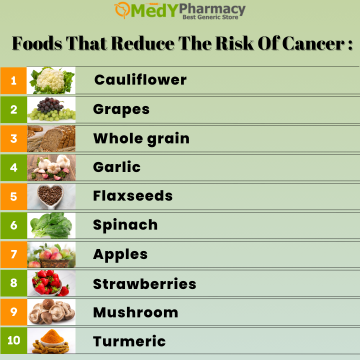
- Cauliflower:
Cauliflower is rich in vitamin C, glucosinolate, and folate. These substances reduce inflammation, strengthen the immune system, and aid in the maintenance of healthy DNA. This anti-cancer meal lowers the incidence of esophageal, lung, colorectal, mouth, and throat cancers.
Make steamed or roasted cauliflower a regular part of your diet. Cook for less than 10 minutes. It ensures the presence of protecting substances in your foods.
- Grapes:
Grapes contain a wide range of phytochemicals. Resveratrol, found in grapes, is a powerful antioxidant. Grapes may reduce the risk of skin cancer, liver cancer, breast cancer, and prostate cancer.
Purple and red grapes have more resveratrol than green grapes, making them superior anti-cancer nutrients. Grapes with skin contain more resveratrol.
- Whole grain:
These are preferred over refined grains because they provide more nutrients. Refined grains lack germ and bran. Whole grains include physic acid, which helps to prevent cell damage and lowers the risk of developing cancer.
Phenolic acids and lignans boost cells’ antioxidant and anti-inflammatory capabilities. Whole grains promote the growth of beneficial bacteria in the colon.
- Garlic:
Garlic is a common element in our daily meals. This cancer-preventive meal reduces the incidence of stomach, prostate, liver, and colorectal cancers. Allow the garlic to sit for about 10 minutes before cooking to boost the development of beneficial chemicals.
These active compounds found in garlic stimulate the enzymes that kill cancer cells. It also inhibits the enzymes that activate cancer-causing chemicals.
- Flaxseeds
Flaxseed helps to reduce the risk of breast cancer, prostate cancer, and colorectal cancer. It is high in vitamin E, dietary fiber, and phenolic acid. Ground flaxseed is more nutritionally beneficial than whole flaxseed.
- Spinach:
Spinach is high in dietary fiber, vitamin C, carotenoids (lutein, beta-carotene, and zeaxanthin), folate, and flavonols. This is high in dietary fiber, which aids weight loss. Excess body weight is associated with approximately 13 types of cancer.
It lowers the risk of colon cancer. It. Spinach may also help reduce the chances of breast, bladder, and lung cancer.
- Apples:
These are high in dietary fiber and phytochemicals including flavonols and triterpenoid molecules. Apples can help lessen the incidence of breast, colorectal, lung, and mouth cancer.
Apples include phytochemical substances that can inhibit cancer cell growth and accelerate cancer cell self-destruction.
- Strawberries
Berries gather disease-fighting awards in the same way that children collect trophies in sports: they keep increasing. According to research, there may be some protection against heart disease, memory deterioration, and even cancer. A recent study found that berry extracts reduced the growth of cancer cells, with strawberry and black raspberry extracts having the greatest effect on colon cancer cells.
Strawberries and raspberries include antioxidants such as vitamin C and ellagic acid, a phytochemical. In lab testing, ellagic acid appears to have anti-cancer effects that activate enzymes that eliminate cancer-causing chemicals and limit tumor growth.
- Mushroom
Reishi, a medicinal mushroom, is the next most significant substance for curing cancer. It is used in the treatment of breast cancer in combination with normal therapy or as an adjuvant single drug, and it has been demonstrated to improve immune function and alleviate tumor-related symptoms.
It works by strengthening the immune system, shrinking tumors, and preventing cancer metastasis.
- Turmeric
The Amazing Anti-Cancer Spice Turmeric’s major constituent is curcumin, which may have anti-cancer properties. According to laboratory research, this chemical in turmeric can inhibit anti-cancer cell transformation, proliferation, and invasion. As a result, you can incorporate turmeric into your everyday meals regularly to enhance the flavor while also efficiently combating cancer.
Vitamin D3 Can Prevent Cancer
This is a food supplement used to treat cancer. Vitamin D is renowned for its potential to control inflammatory pathways linked to cancer. It is critical for a fully functioning immune system.
Vitamin D impacts cancer cells’ ability to multiply, hence it is an essential vitamin for cancer patients. You can spend around 20 minutes per day outside in the sun or take a vitamin D3 pill.
Low-Stress Levels to Decrease Cancer
You must maintain your stress levels as low as possible since excess stress can negate all of the benefits of a healthy diet and supplements by turning off your immune system and making you more susceptible to cancer. To allow these therapies to work, you must sleep eight to nine hours per night and avoid being overly stressed.
Anti-Cancer Tip
Begin buying healthier foods. Keep fresh produce, beans, nuts, seeds, and whole grains on hand so that you can eat actual things when you’re hungry.
- Pay close attention to food labels. Avoid or restrict foods high in added sugar.
- Utilize healthier cooking methods. Instead of frying or charbroiling, try baking, broiling, or poaching your food.
- Maintain proper dehydration Drink water rather than sugary beverages.
- Avoid or restrict alcohol consumption. According to the standards, ladies should limit themselves to one drink per day and males to two drinks per day.
Trying to avoid anti-cancer requires more than just eating a healthy diet. You should also pursue a healthy lifestyle that includes weight management.
- Engage in daily exercise. Aim for 30 minutes each day or at least 120 minutes of moderate-intensity exercise per week (such as brisk walking).
- Good sleep. Try to get seven or eight hours per night.
- Reducing stress. Chronic stress promotes chronic inflammation. Bandrone 150 Meditation, deep breathing exercises, and yoga can all help reduce stress.
- Give up smoking. Many types of anti-cancer have a direct link with smoking. All facets of a healthy lifestyle contribute to your chances of avoiding cancer.
Whole Grains: Benefits for the Whole Body
The next time you visit the deli, keep in mind that bland white bread cannot compete in taste or nutrition with substantial whole wheat bread. Perhaps you’ve heard about the latest federal dietary rules, which state that half of all grains you eat — including rice, cereal, and even chips — should be whole. That is why even sugary children’s cereals and frozen pizzas are loaded with healthy grains.
If a patient takes care of himself, eats healthy food, and maintains his usual life while dealing with a fatal sickness like cancer, he can fight cancer.
Cancer cannot be cured solely by nutrition; it is also vital to employ medications because this combination improves the patient’s recovery rate.
If you are a cancer patient receiving Antreol 1 medications, you can look up the price of these medications or buy them online.
So you may save money, and time, and get your medicine on time. Medypharmacy provides a significant discount on anti-cancer medications and their replacements.







